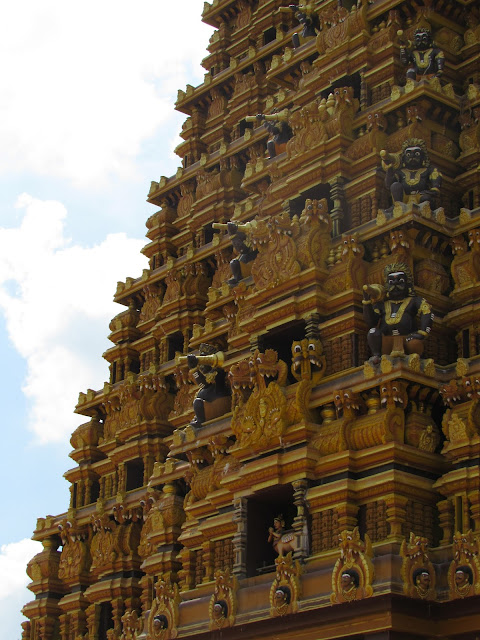The skyline of Tripoli
This week I read "Sandstorm: Libya in the Time of Revolution", which follows the
months of fighting around the revolution. The author conformed to the
dominant western depiction of Gaddafi as devious but blundering kook,
and a pervert at that. From our standpoint, he seems almost a cartoon
villain, complete with a face collapsing from botox and a squad of
suspiciously attractive female body guards. But in Africa, he was
often thought of quite differently. Libya was quite a wealthy country
– it has a lot of oil and a low population to split the proceeds.
Gaddafi was generous with this wealth. He supported what he saw as
social change around Africa, from the terrorist Charles Taylor in
Libya to the revolution in South Africa. Nelson Mandala saw him as a
great friend. When I traveled to Kampala, in Uganda, I was struck by
the magnificent mosque that dominated the skyline. When I went to
visit, my guide enthusiastically told me that Gaddafi had built it.
The Libyan people too, benefited from this wealth. Education was
universal, literacy improved, and women's status increased with their
education.
Gaddafi's National Mosque I visited in Kampala. Unfortunately my pictures didn't survive the trip, so you'll just have to imagine me posing with it in a pink rhinestoned hijab.
Gaddafi with his 'Green Book', a manifesto he wrote and mandated study of in Libya
The problem comes with absolute power.
Gaddafi never took an official leadership title, claiming that “the
people” lead Libya, and he was merely a guide. But an
institution-less government meant there were no checks on his power.
He treated governance as a playground for his family and friends.
When power is based entirely upon relationships, there is no room for
truth. No room for dissent. Instead, there were prisons. Dissenters
were quickly hidden in these black holes, with no access to the
outside world. Many died of starvation or torture. Families brought
food and clothes to their loved ones week after week, only to
eventually find out they had died years ago. The population was well
educated, but without connections there were no jobs to be had –
the government had a stranglehold on every sector of business. After
40 years, Libyans were tired. They were tired of the endless dull
humiliation of unemployment. Tired of seeing their money splashed
carelessly across the continent. Tired of waiting, hoping, that one
day their sons and brothers and husbands would emerge from prison
alive. So they began to fight. A barely armed ragtag group of
untrained young men stands little chance against a national army
armed with some of the most expensive weapons in the world. It looked
bleak for the revolution. Until the United States began to fight on
their side.
Gaddafi turned into a meme by the revolution - in this speech he claims he will hunt the rebels down 'zenga zenga', or alley by alley. This threat was transformed into a catchy dance number.
My lifelong study of violence has,
paradoxically, left me not unconditionally against violence. I
believe in the potential for killing to prevent killing. I would
gladly reach back in time and fire the gun that could have prevented
the Rwandan genocide: it could have been done, should have been done.
Even a hundred lives of the tiny elite who orchestrated the slaughter
is surely worth the 80,000 who died for their hate. The problem is
we can never know what would have happened had we not acted. Unspilt
blood doesn't stain. So Libya emerges as a test: we fought on the
side of “the people”. Did they win?
The easy answer is No. Libya dropped off the media map. I struggled to find an article on
their post-Arab Spring prospects written in the past year. And
perhaps this was the death of it. As Western attention faded, so did
any semblance of order. Ghaddafi left a fractured country without
established institutions, a country where the only people left
qualified to lead had been in exile so long they barely knew Libya.
The fragile interim government failed to bring the country together.
Now hundreds of armed groups vie for power in the aftermath, and the
Muslim Brotherhood grows in the vacuum. Gaddafi may have been a
dictator. But ultimately, it seems, he was better than nothing. So
should we have acted? Should we have allowed the slaughter that
surely would have occurred if the US didn't act to protect the
rebels? Or by preventing it did we just allow a drawn out slaughter
which will consume the whole country? Libya offers the hard lesson:
you cannot act without taking responsibility. Western assistance
dried up with Gaddafi's death, and without this, it is little wonder
the inexperienced and unprepared idealists who tried to built a
functioning government from the rubble of revolution failed. We
bought them a revolution. But it is the Libyan people, now, who pay
the price.
Bhengazi after years of fighting
If you are interested in learning more about post-revolution Libya, I found these articles helpful.
http://www.theguardian.com/world/2015/feb/16/libyas-arab-spring-the-revolution-that-ate-its-children
http://www.independent.co.uk/voices/commentators/libya-from-arab-spring-to-islamist-autumn-9836925.html











